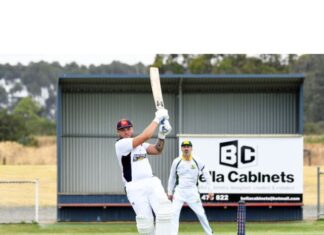A BLIND humanitarian has proved that you don’t need sight to have an inner vision for peace and unity.
Undeterred by the condition of his eyes, Narre Warren resident Ian Pickering has made more than a dozen self-funded trips overseas with Action Aid Australia in support of projects that will essentially make lives easier for people in third world countries.
At age 36, when Mr Pickering was working as a primary school teacher and enjoying life with his wife Lyn and four young children, his sight began to deteriorate.
Two years later he was classified as blind. Doctor told him it was macular degeneration- Stargarts Type, meaning he did not have central vision. His vision was at 5 per cent, and it was peripheral.
Concerned for the safety of the schoolchildren, Mr Pickering was forced to make a difficult decision. Mrs Pickering got a job as a secretary at a local school, and Mr Pickering retired.
“It was a scary time,” he remembered, “and it was a hard decision to make.”
Determined to stay active, Mr Pickering operated a small wholesale nursery from his home. He also volunteered at the school, worked for eight years as part-time education officer for the National Resources Conservation League planting trees with children and teaching Victoria schools and educating communities on Earth preservation, and joined the Rotary Club of Narre Warren.
Mr Pickering’s life would change drastically after a guest speaker visited the Rotary club in 1988.
He said his ears pricked up when the speaker from Action Aid Australia told the club about disadvantaged communities in India and Bangladesh. Mr Pickering signed up to volunteer with the club, and then joined the honorary board of directors.
In 1992 he ventured on his first-ever trip outside of Australia, to Bangladesh and India.
Mr Pickering said the loss of his eyesight did not deter him from travelling to a third world country.
“I thought life was over when I finished teaching,” he said. “But this experience was the beginning of my second life. It became a passion.”
Mr Pickering arrived in India without any complications. He said the people were very similar to Australians, but the conditions that many lived in were horrific.
“When I got there I realised the people were very normal, they were just like us,” he said. “But some lived in the most disgusting conditions that we (in Australia) wouldn’t even allow animals to live in.”
He met members of Action Aid partner organisation SEDS (Social Education and Development Society) Rajan, who was in charge of project activities and his wife Manil, who did administrative work. They worked together to support and educate the Indians about environmental projects.
Action Aid funded the projects, and the members monitored the Indians’ work.
“We believe in giving them a hand up, rather than a hand out,” Mr Pickering said.
In collaboration with other humanitarian groups across the world, Action Aid Australia funded watershed management projects, which included the installation of water catchment facilities, fish seeding and tree planting.
“When the Indians first began planting trees on the barren hills, there was nothing there. Everything was wiped out from the depression,” he said.
A forest began to take shape after several trips, hours upon hours of planting, and increased knowledge among the locals about the importance of environmental upkeep.
“You could begin to hear birds in the trees. Soon people saw lizards, then frogs. Most recently, people have seen deer in the forest,” Mr Pickering said with a smile beaming across his face. “Nature is coming back.”
In 1994, Mr Pickering became an honorary chairman of Action Aid Australia, and his family and friends began to share his vision.
His wife Lyn joined him on 11 of his trips, and with her help, a sponsorship program was created so people could sponsor children to go to school or sponsor a toilet for the school building.
Their grand-daughter Kirra joined on two trips, once when she was seven and again when she was 13.
“I was so pleased when she came along,” Mr Pickering said. “She mixed so well with all the Indian children. There was no discrimination, nothing.”
During his travels, the Rotary Club of Narre Warren took an interest in Action Aid Australia’s work, and supported matching grant programs for developing countries.
Though Mr Pickering stepped down from his role as honorary chairman of Action Aid to take on the Rotary role of District Governor he continued to combine his involvement in both groups by speaking at Rotary conferences in India and Indonesia as well as the local District D9820 Conference and local Rotary clubs. He also spoke about his experiences to other clubs, including U3A, Probus, vision groups, schools, and garden clubs.
Mr Pickering resumed the role as honorary chairman of Action Aid in 2002 until 2006, and is currently an honorary director of Action Aid Australia alongside Mrs Pickering. He is also the current president of the Rotary Club of Narre Warren.
In 2007 Mr Pickering’s passion, strength, and determination was recognised when he received Rotary’s highest honour, the Service Above Self Award. He is the only member in District 9820’s 50-year history to have received the award. Mr Pickering said he was honoured, but was not looking for recognition.
“I do what I do for satisfaction. I do it to help other people develop skills,” he said. “And I’ll continue to do it for as long as I am able.”
Green warrior
Digital Edition
Subscribe
Get an all ACCESS PASS to the News and your Digital Edition with an online subscription
Bulls charge to outright
Cardinia’s demolition job of Pakenham reached outright status on day two of round 13 of the Casey Cardinia Cricket Association (CCCA) Premier Division.
The wounded...







